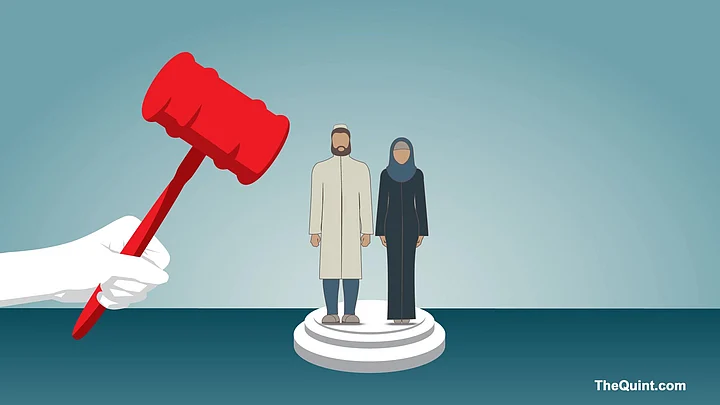Taliban spokesperson Zabihullah Mujahid on Tuesday, 17 August, in his first news conference since the Taliban took control of Afghanistan said all Afghans must live "within the framework of Islam".
He also mentioned that "independent" media and journalists will be allowed to work as long as they follow their rules and don't "work against national values," and assured the world that the Taliban would respect women's rights.
However, women and activists are skeptical about the "change" the Taliban is talking about. They fear that with the return of Taliban rule in Afghanistan, Sharia law will be imposed and it will restrict women's rights.
What is this law? How does it impact women? Here's a primer.
What is Sharia?
The meaning of Sharia in Arabic is "the way". It does not refer to the legal system.
It is a broad set of moral and ethical principles derived from the Quran and the practices and maxims of Prophet Muhammad.
Sharia is not a statute or judicial precedent imposed by the government, nor is it a set of statutes governed by a court.
According to Council on Foreign Relations, Sharia developed hundreds of years after the death of the Prophet Muhammad in 632 AD when the Islamic empire expanded to the edge of North Africa in the west and China in the east.
The customs that were followed by Prophet Muhammad were compiled by scholars and later became an example for all the Muslims. The compilation is called Hadith.
There are two factors that determine how Sharia law is configured: One is qiyas, which refers to analysis, and the other is ijma or legal consensus.
Schools like the Hanbali, which is followed in Saudi Arabia and by the Taliban, and liberal schools like the Hanafi, are some of the ultra orthodox schools of Islamic jurisprudence.
The Taliban mainly belongs to the Pashtun ethnic group in Afghanistan and its members are followers of Sunni Islam.
The group follows a narrow and extreme version of Sharia that includes practices such as public executions, banning music, television and videos, and beating up men who do not pray five times a day or cut their beards, reported iNews.
Most of the main roles in this militant group are held by men. This has raised the question of how the organisation’s interpretation of Sharia law will affect its treatment of ethnic and religious minorities in Afghanistan.
In addition, since there are no women among Islamic clergy, there is concern that women's interests may not find a place in the legal and political order.
Where All is Sharia Law Practised?
Some countries choose to integrate certain aspects of the Sharia law with the European system, while others, such as Saudi Arabia, Qatar, and Iran, follow it more closely, reported iNews.
The interpretation and strictness of the Sharia law varies from country to country, depending on the government in charge.
Many countries in Africa follow aspects of the Sharia law. These include Nigeria, Kenya, and Ethiopia. Bahrain, Brunei, Egypt, Indonesia, Iran, Iraq, and Pakistan are a few countries where Sharia is practised.
In September 2020, Sudan officially became a secular state and ended 30 years of Islamic law.
What Does Sharia Mean for Women in Afghanistan?
Earlier this year, the Taliban had stated it wanted to establish “a genuine Islamic system” in Afghanistan.
A system that would include the rights of women and all ethnic minorities in accordance with "cultural traditions and religious rules."
However, the militant group plans to end co-education and have women barred from going to their offices.
During the Taliban rule from 1996 to 2001, it was mandatory for all women to wear burqas. Girls were not allowed to go to school, they were not allowed to get medical services provided by men, and if a woman had to step out, she had to be escorted by a male relative, under the rule of Taliban.
Women were also barred from wearing high heels so that no man would hear their footsteps. If a woman was talking in public, her voice should be so low that no stranger could hear it.
Films, photographs, or any kind of pictures of women in books, newspapers, and shops were not allowed by the Taliban.
Women who did not follow these rules were beaten up, even stoned, and in some cases even executed publicly, during the Taliban rule.
Crimes And Punishment Under Sharia
There are three categories for crimes under the Sharia law: Tazir, qisas, and hududs.
Tazir is considered the lightest and the least serious and is left to the discretion of the judge.
Qisas are the crimes that result in the offender being subjected to the exact same affliction as the victim.
Hudud is the most serious crime and is considered a crime against God.
Tazir crimes include domestic robbery or attempted robbery, as well as perjury.
For crimes that fall under qisas, for instance, in a murder case, if the court approves, the murderer can be killed after conviction.
Adultery, wine drinking, and false accusations of improper sexual relations are included in hudud, which means that the person who has committed the crime can be killed, stoned, or executed, reported First Post.
(With Inputs from News18, First Post, and iNews)
